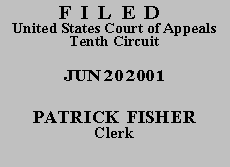

| EDMUND WRIGHT,
Petitioner-Appellant, v. JOE R. WILLIAMS, Warden, Lea County Correctional Facility; ATTORNEY GENERAL FOR THE STATE OF NEW MEXICO, Respondents-Appellees. |
|
Petitioner Edmund Wright, applying for a certificate of appealability (COA) pursuant to 28 U.S.C. § 2253(c), seeks to appeal the district court's dismissal of his petition for a writ habeas corpus pursuant to 28 U.S.C. § 2254. Because we determine that petitioner has failed to demonstrate a "substantial showing of the denial of a constitutional right," see § 2253(c)(2), we deny his application and dismiss the appeal.
Under the Antiterrorism and Effective Death Penalty Act of 1996, codified in relevant part at 28 U.S.C. § 2254(d),
a state prisoner will be entitled to federal habeas corpus relief only if he can establish that a claim adjudicated by the state courts "resulted in a decision that was contrary to, or involved an unreasonable application of, clearly established Federal law, as determined by the Supreme Court of the United States," or "resulted in a decision that was based on an unreasonable determination of the facts in light of the evidence presented in the State court proceeding." Further, "a determination of a factual issue made by a State court shall be presumed to be correct." That presumption of correctness is rebuttable only "by clear and convincing evidence." Id.
Boyd v. Ward, 179 F.3d 904, 911-12 (10th Cir. 1999) (quoting § 2254(d) &(e)(1)). The Supreme Court has determined that a state court decision is "contrary to" clearly established federal law "if the state court arrives at a conclusion opposite to that reached by [the Supreme] Court on a question of law or if the state court decides a case differently than [the Supreme] Court has on a set of materially indistinguishable facts." Williams v. Taylor, 529 U.S. 362, 412-13 (2000). A state court decision is an unreasonable application of federal law "if the state court identifies the correct governing legal principle from this Court's decision but unreasonably applies that principle to the facts of the prisoner's case." Id. at 413. The district court concluded that Mr. Wright was not entitled to federal habeas relief because he had not satisfied this standard, and denied his request for a COA.
In his application for COA, Mr. Wright raises the same issues raised in his habeas petition: (1) the trial court erred by failing to grant his motion to suppress evidence; (2) the court erred at sentencing by enhancing each of his convictions; and (3) the court erred by enhancing his convictions with prior convictions that were more than ten years old. We have reviewed the entire record, including the magistrate judge's report and recommendation adopted by the district court, and petitioner's brief and application for a COA. For substantially the same reasons set forth in the report and recommendation filed on September 7, 2000, we agree that Mr. Wright has failed to meet his burden, with additional explanation as to issue two.
Mr. Wright argues that his sentence was wrongfully enhanced because his three convictions for assaulting three different officers during his arrest arose out of the same occurrence or transaction. It is true that when multiple prior felony convictions arise out of a unified course of events, those convictions will count as only a single prior felony conviction for enhancement purposes. See State v. Baker, 562 P.2d 1145, 1146 (N.M. Ct. App. 1977). Mr. Wright's most recent assault convictions, however, are not the prior felony convictions the court used to enhance his sentence -- they are the convictions themselves that are subject to enhancement. As the court in Baker noted, each new felony conviction, even though related to a single event, may be enhanced by a prior felony conviction. See id. at 1148.
The state district court enhanced each of Mr. Wright's convictions with three prior felony convictions: one for auto burglary from September 1982; one from February 1983 for convictions for assault with intent to commit a violent felony, attempted criminal sexual penetration, and residential burglary; and one for convictions for arson and commercial burglary for which he was sentenced in May 1987. See R. Doc 12, Ex. E, F. Clearly, the court followed the Baker rule. Mr. Wright has failed to make a substantial showing of the denial of a constitutional right in this regard.
We DENY petitioner's application for a COA and DISMISS the appeal.
The mandate shall issue forthwith.
Entered for the Court
Circuit Judge
*. This order and judgment is not binding precedent, except under the doctrines of law of the case, res judicata, and collateral estoppel. The court generally disfavors the citation of orders and judgments; nevertheless, an order and judgment may be cited under the terms and conditions of 10th Cir. R. 36.3.